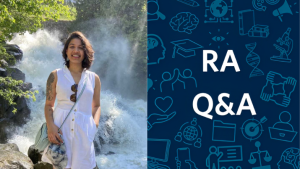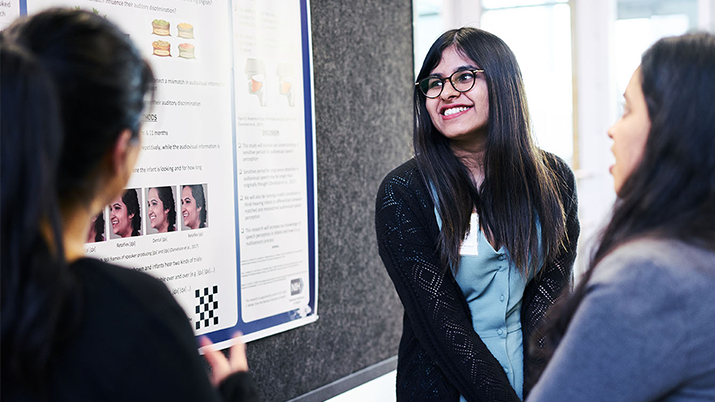

Osheen Dayal, a fourth-year undergraduate Psychology student, has always been interested in the topic of social support. She is currently enrolled in PSYC240, working as a Research Assistant in the Health and Adult Development Lab, led by Dr. Christiane Hoppmann. The Health and Adult Development Lab explores the role of social relationships and motivational processes for well-being and health. The lab aims to identify key social and motivational resources that contribute to the successful mastery of challenges and pathways to well-being and health across the adult lifespan.
In her position, Osheen is a part of various teams within the lab. She focuses on screening research participants, obtaining informed consent, and conducting online participant sessions. Osheen also plays a role in participant recruitment for the lab. This often involves reaching out to external liaisons and engaging in conversations at events to bring light to the study.
How did you first learn about PSYC240 and what motivated you to apply?
I heard about PSYC240 when I was volunteering as an RA. I enjoyed working in the lab, so being able to earn course credits doing what I was already involved in was definitely something that motivated me. I firmly believe that volunteering in labs provides invaluable firsthand experience whether it be working with diverse participants, adhering to protocols, handling devices, or managing data.
What intrigues you about research at this lab in particular?
What particularly intrigues me about the research in the Health and Adult Development Lab is the exploration of social support. I moved from a collective society into a more isolated environment in Canada and experienced the importance of social support. COVID-19 further highlighted this need, especially for older adults who are vulnerable and often isolated. The lab’s focus on how various forms of social support impacts mental and physical health and lifestyle habits among individuals over 60 resonated deeply with me.
What skills or experience did you gain from PSYC240 that you find valuable?
I have been able to reflect more on my work in the lab by writing monthly reflection papers as a part of PSYC240. Inside the lab, I’m able to engage with diverse participants. I have also honed my ability to decipher valuable data and understand the nuances of following ethical protocols, which goes beyond the certification from the Tri Council.
What is your favourite part of working in the lab?
My favorite aspect of working in the lab undoubtedly revolves around the people involved. The camaraderie and support between everyone creates a wonderful environment. I also find working directly with participants during our extended sessions incredibly rewarding. Engaging with them for up to three hours allows us to establish meaningful connections and gain insights into their experiences.
Being part of this lab has not only provided me with professional experiences, but also served as a source of social support. Our bi-weekly meetings, where we delve into relevant journal articles, have been enriching, allowing us to learn and grow collectively.
Do you have any advice for students?
Understanding research goes beyond theoretical learning; it involves practical execution including venturing into the field, recruiting participants, and effectively communicating about the study. It’s a platform where you enter with a skill and leave with a multitude.


